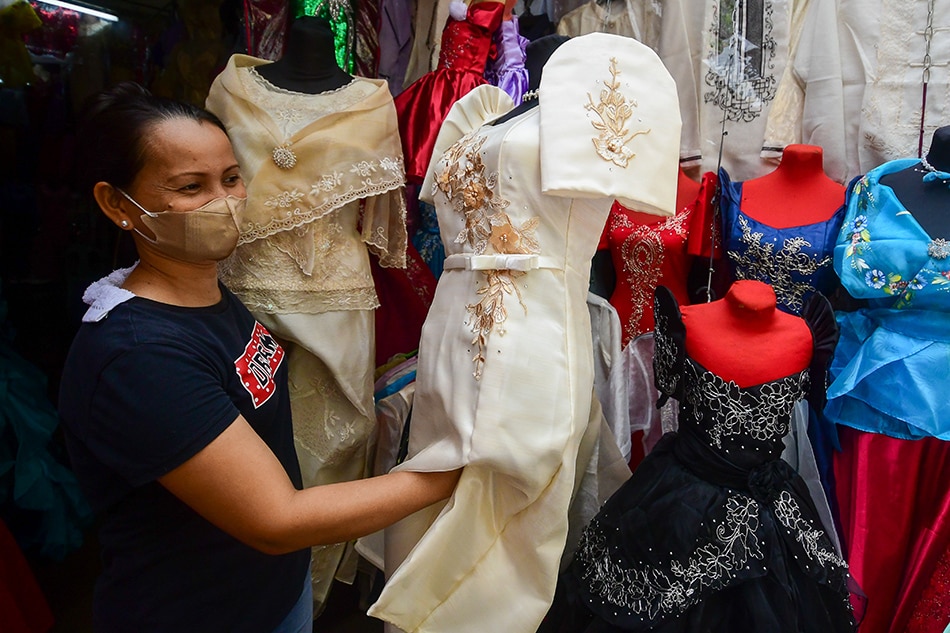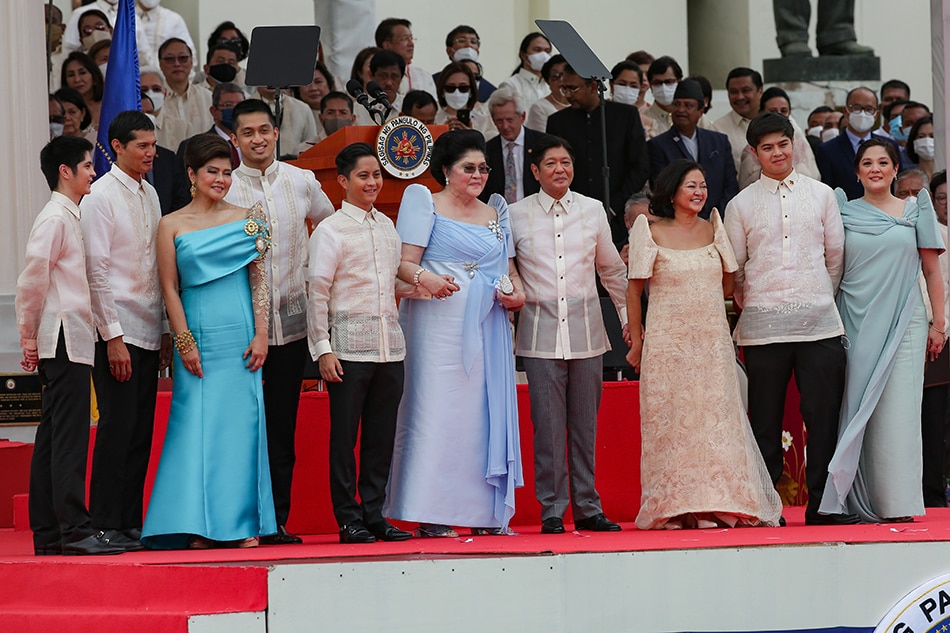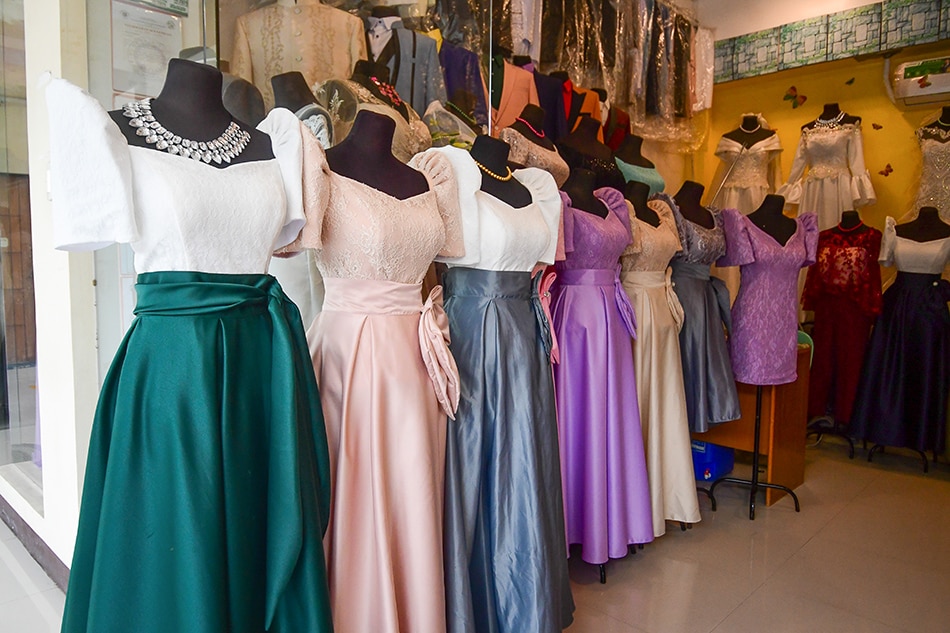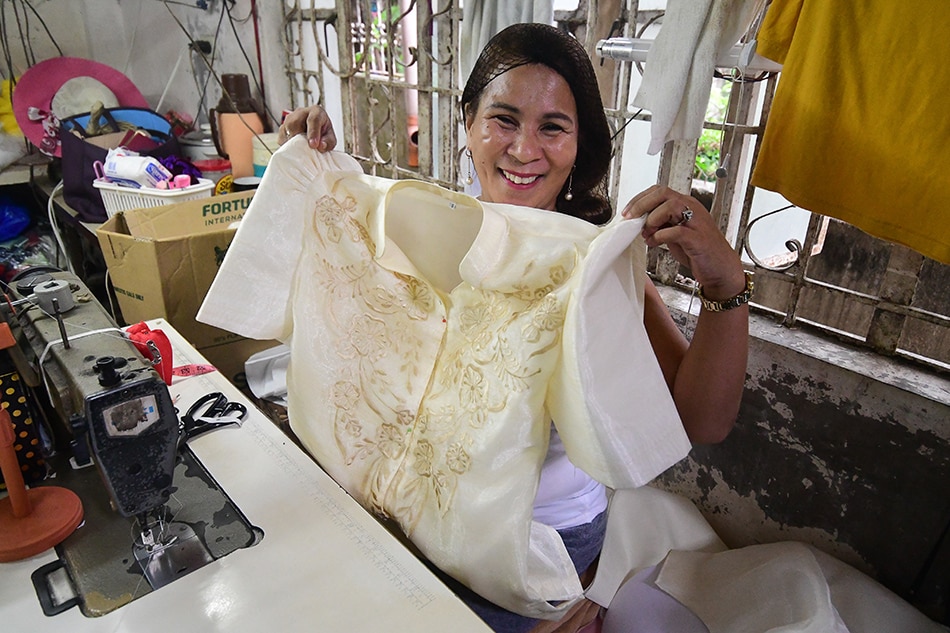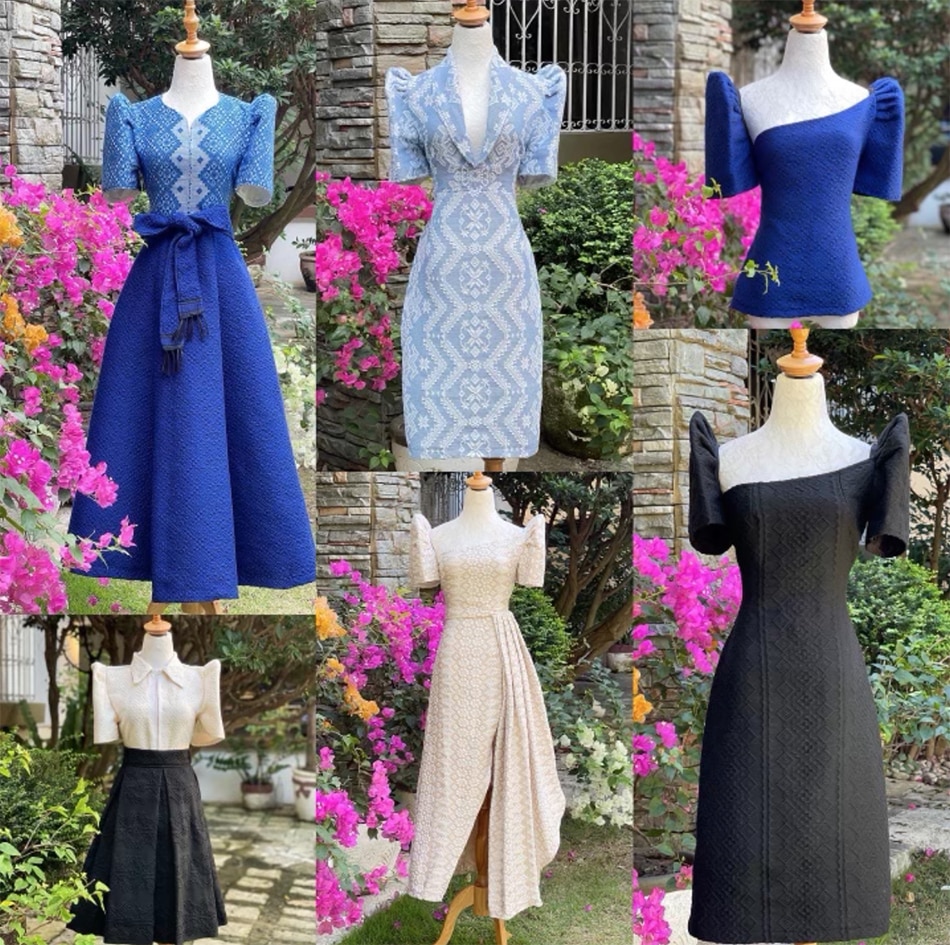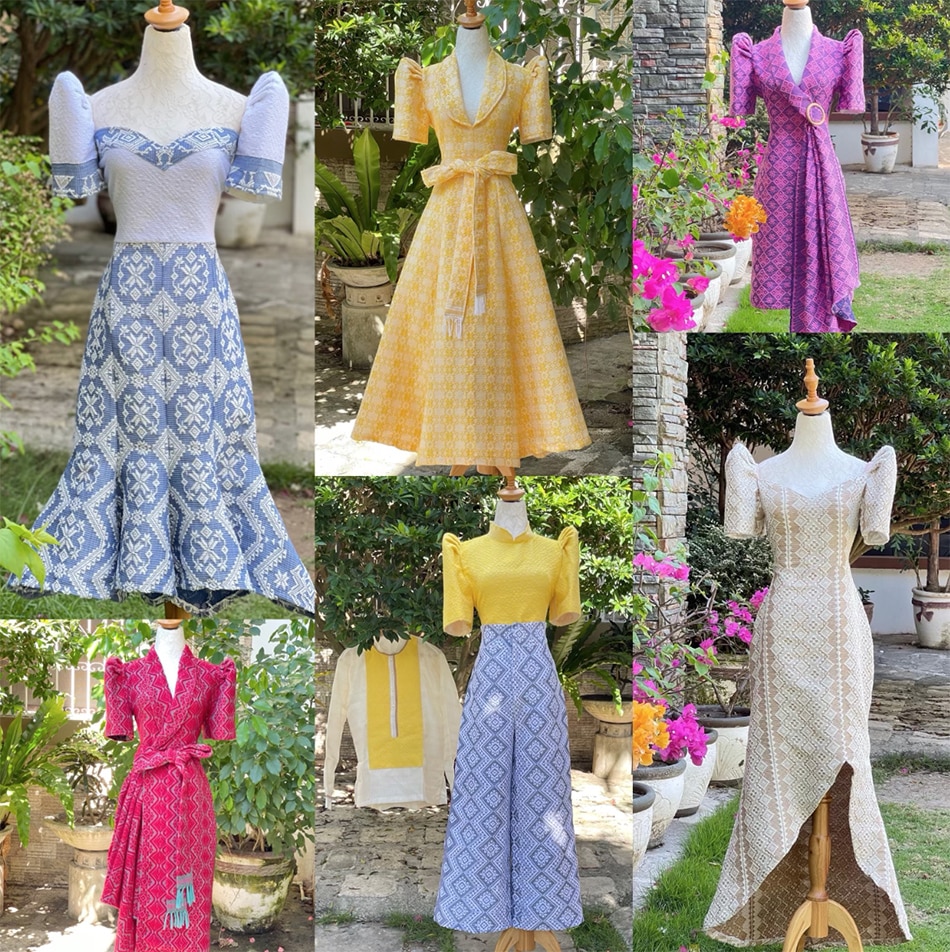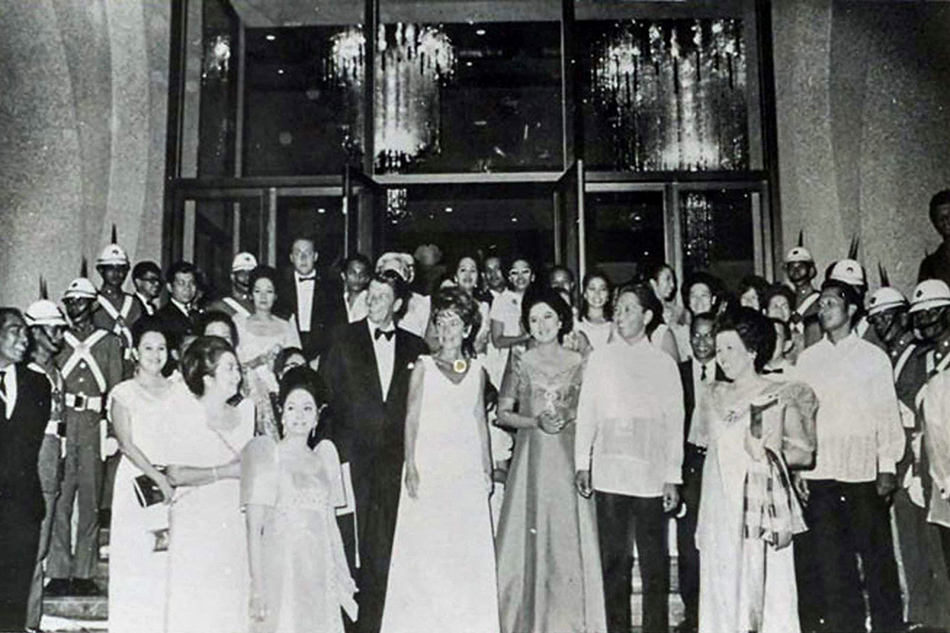Like the barong, the terno belongs to all Filipinos | ABS-CBN

Welcome, Kapamilya! We use cookies to improve your browsing experience. Continuing to use this site means you agree to our use of cookies. Tell me more!
Like the barong, the terno belongs to all Filipinos
Like the barong, the terno belongs to all Filipinos
Wena Cos,
ABS-CBN News
Published Jul 04, 2022 10:01 PM PHT
|
Updated Jul 05, 2022 11:15 AM PHT
This is the final part of a feature series on the terno. Read parts one on the dissociation of the terno from its Imeldific iconography here, and the terno kept alive beyond the 'Iron Butterfly' here.
This is the final part of a feature series on the terno. Read parts one on the dissociation of the terno from its Imeldific iconography here, and the terno kept alive beyond the 'Iron Butterfly' here.
MANILA -- Ternos once again took centerstage at the inauguration of President Ferdinand Marcos Jr. last week.
MANILA -- Ternos once again took centerstage at the inauguration of President Ferdinand Marcos Jr. last week.
Vice President Sara Duterte wore a cream terno decorated with flowers and a blush pink accent.
Vice President Sara Duterte wore a cream terno decorated with flowers and a blush pink accent.
First Lady Atty. Louise "Liza" Araneta-Marcos arrived with the President in a full-length champagne piece, while the President's mother, former First Lady Imelda Marcos, was in a baby blue classic cut terno, adorned with a large brooch on the left side of her chest.
First Lady Atty. Louise "Liza" Araneta-Marcos arrived with the President in a full-length champagne piece, while the President's mother, former First Lady Imelda Marcos, was in a baby blue classic cut terno, adorned with a large brooch on the left side of her chest.
ADVERTISEMENT
The President's sister, Senator Imee Marcos, attended the inauguration in an asymmetric turquoise off-shoulder terno, its one sleeve heavily decorated with gold.
The President's sister, Senator Imee Marcos, attended the inauguration in an asymmetric turquoise off-shoulder terno, its one sleeve heavily decorated with gold.
Her official social media account later revealed that the senator designed the terno herself, and decorated it with gifts from her late father.
Her official social media account later revealed that the senator designed the terno herself, and decorated it with gifts from her late father.
Though with a more modern design, it was a terno true to its essence: a piece of clothing that carries with it history.
Though with a more modern design, it was a terno true to its essence: a piece of clothing that carries with it history.
Gino Gonzales and Mark Lewis Higgins showed that rich history in their book "Fashionable Filipinas: An Evolution of the Philippine National Dress in Photographs, 1860-1960." Through many alterations and adjustments to fit the times, the terno survived and remains a Filipinana staple today.
Gino Gonzales and Mark Lewis Higgins showed that rich history in their book "Fashionable Filipinas: An Evolution of the Philippine National Dress in Photographs, 1860-1960." Through many alterations and adjustments to fit the times, the terno survived and remains a Filipinana staple today.
They credited events such as the TernoCon in 2020, beauty pageants, and even ABS-CBN balls which helped bring back a wider appreciation for the terno today.
They credited events such as the TernoCon in 2020, beauty pageants, and even ABS-CBN balls which helped bring back a wider appreciation for the terno today.
"In recent years, more Filipinas have donned the terno again, partly in thanks to the fashion sector, and organizations like the CCP and companies like Bench," Higgins and Gonzales said.
"In recent years, more Filipinas have donned the terno again, partly in thanks to the fashion sector, and organizations like the CCP and companies like Bench," Higgins and Gonzales said.
The Bench-led TernoCon paid tribute to the Filipiniana attire, with celebrities donning various interpretations, both classic and modern, of the terno made by some of the country's top designers.
The Bench-led TernoCon paid tribute to the Filipiniana attire, with celebrities donning various interpretations, both classic and modern, of the terno made by some of the country's top designers.
Even the President's State of the Nation Address (SONA) became a platform for the terno. The SONA had become a red-carpet event of sorts, where female politicians, or spouses and relatives of those in office would arrive in bespoke ternos at the Batasang Pambansa for the event.
Even the President's State of the Nation Address (SONA) became a platform for the terno. The SONA had become a red-carpet event of sorts, where female politicians, or spouses and relatives of those in office would arrive in bespoke ternos at the Batasang Pambansa for the event.
In 2016, however, this was shunned by the Duterte administration, and then house-speaker Pantaleon Alvarez asked attendees to come instead in simple business attire.
In 2016, however, this was shunned by the Duterte administration, and then house-speaker Pantaleon Alvarez asked attendees to come instead in simple business attire.
"SONA 'yung pupuntahan natin, hindi party," Alvarez said at the time.
"SONA 'yung pupuntahan natin, hindi party," Alvarez said at the time.
The terno has been modernized by today's designers to fit the the chic and more functional tastes of the Filipina today. From its previous designation as formal wear for special events, the terno has been turned into semi-formal wear and even incorporated in business clothing for women.
The terno has been modernized by today's designers to fit the the chic and more functional tastes of the Filipina today. From its previous designation as formal wear for special events, the terno has been turned into semi-formal wear and even incorporated in business clothing for women.
Ternos in the form of ladies' barongs with butterfly sleeves paired with skirts and pants are now available in the market. Other shops offer boleros and blazers with butterfly sleeves, while others offer just the butterfly sleeves sold per pair attachable to dresses and tops.
Ternos in the form of ladies' barongs with butterfly sleeves paired with skirts and pants are now available in the market. Other shops offer boleros and blazers with butterfly sleeves, while others offer just the butterfly sleeves sold per pair attachable to dresses and tops.
But Higgins and Gonzales cautioned against any additional modification to the attire.
But Higgins and Gonzales cautioned against any additional modification to the attire.
"Any attempt to alter the sleeve in any further way will diminish the idea of a terno entirely because it is the last bastion of the Philippine dress," they said.
"Any attempt to alter the sleeve in any further way will diminish the idea of a terno entirely because it is the last bastion of the Philippine dress," they said.
A reintroduction of the tapis or the knee-length cloth worn around the waist above the skirt and pañuelo or the triangular shaped fabric worn around the shoulders is most welcome, they added. They also hoped for more designers to experiment with indigenous textiles and materials.
A reintroduction of the tapis or the knee-length cloth worn around the waist above the skirt and pañuelo or the triangular shaped fabric worn around the shoulders is most welcome, they added. They also hoped for more designers to experiment with indigenous textiles and materials.
Ilocano brand Handwoven Beauty features modern cuts of the terno for formal events and daily wear using the indigenous Inabel fabric. Only 2 years old, Dianne Miranda's venture started as a small business of Inabel masks at the onset of the pandemic.
Ilocano brand Handwoven Beauty features modern cuts of the terno for formal events and daily wear using the indigenous Inabel fabric. Only 2 years old, Dianne Miranda's venture started as a small business of Inabel masks at the onset of the pandemic.
Miranda partnered with weavers who have since depended on her orders of abel for their livelihood. She expanded the brand to handwoven dresses and blankets, and now with over 45,000 followers on its Instagram, Handwoven Beauty even has clients and resellers from abroad.
Miranda partnered with weavers who have since depended on her orders of abel for their livelihood. She expanded the brand to handwoven dresses and blankets, and now with over 45,000 followers on its Instagram, Handwoven Beauty even has clients and resellers from abroad.
"Nag-try ako ng mga plain tops muna, tapos may nagpagawa ng Filipiniana, until such time na tumaas 'yung demand. Bumabalik kasi 'di ba 'yun uso. So lahat ngayon halos 'yun ang ino-order. Very rare 'yung sleeveless, or ibang type ng sleeve yung ino-order nila," Miranda told ABS-CBN News.
"Nag-try ako ng mga plain tops muna, tapos may nagpagawa ng Filipiniana, until such time na tumaas 'yung demand. Bumabalik kasi 'di ba 'yun uso. So lahat ngayon halos 'yun ang ino-order. Very rare 'yung sleeveless, or ibang type ng sleeve yung ino-order nila," Miranda told ABS-CBN News.
(I tried to market plain tops first, until a client ordered a Filipiniana. The demand for it increased since then, especially now that more people are wearing it. Almost all our orders have butterfly sleeves, very rarely do we get orders for sleeveless designs or other sleeve types.)
(I tried to market plain tops first, until a client ordered a Filipiniana. The demand for it increased since then, especially now that more people are wearing it. Almost all our orders have butterfly sleeves, very rarely do we get orders for sleeveless designs or other sleeve types.)
Handwoven Beauty now has 80 weavers on board, its dresses made from Santiago, Ilocos Sur's very own Pinilian abel, as well as Binakol abel from Vigan, and other abel weaves from different parts of Ilocos.
Handwoven Beauty now has 80 weavers on board, its dresses made from Santiago, Ilocos Sur's very own Pinilian abel, as well as Binakol abel from Vigan, and other abel weaves from different parts of Ilocos.
Each garment is unique, as each panel of abel produced by the weavers can only make up to three dresses, most orders of which differ in cut.
Each garment is unique, as each panel of abel produced by the weavers can only make up to three dresses, most orders of which differ in cut.
While many terno orders are meant for special occasions, Miranda said they also get clients who wear their terno to work, which has prompted them to shift to cotton fibers to make the garment more comfortable.
While many terno orders are meant for special occasions, Miranda said they also get clients who wear their terno to work, which has prompted them to shift to cotton fibers to make the garment more comfortable.
Handwoven Beauty also gets orders for ternos made for children as young as 2 years old, while other clients from the LGBTQIA+ community also wear their Filipinianas.
Handwoven Beauty also gets orders for ternos made for children as young as 2 years old, while other clients from the LGBTQIA+ community also wear their Filipinianas.
With the demand for their Inabel ternos, each order now has to be made with 3-6 weeks lead time. But Miranda is thankful to have such a "good problem" at hand.
With the demand for their Inabel ternos, each order now has to be made with 3-6 weeks lead time. But Miranda is thankful to have such a "good problem" at hand.
"It’s the effort of the weavers, and to respect sa mga nag-pass on sa kanila in the past generations ng Inabel. It’s a piece of art and culture na nasusuot natin. The weaving technique has been passed on to a lot of generations already," she said.
"It’s the effort of the weavers, and to respect sa mga nag-pass on sa kanila in the past generations ng Inabel. It’s a piece of art and culture na nasusuot natin. The weaving technique has been passed on to a lot of generations already," she said.
"We do our best to modernize it to fit in to society the vibrant colors and the different patterns, to keep up with the industry right now. But definitely we still want to preserve the culture that we have, and to keep the weaving industry alive," she added.
"We do our best to modernize it to fit in to society the vibrant colors and the different patterns, to keep up with the industry right now. But definitely we still want to preserve the culture that we have, and to keep the weaving industry alive," she added.
Modern remakes of the terno made it more accessible for the regular Filipino woman, and open to personal interpretations of style.
Modern remakes of the terno made it more accessible for the regular Filipino woman, and open to personal interpretations of style.
When the Marcoses were exiled after the People Power Revolution in 1986, the terno became associated with their extravagant lives funded by the nation's coffers.
When the Marcoses were exiled after the People Power Revolution in 1986, the terno became associated with their extravagant lives funded by the nation's coffers.
To some, it became a symbol of opulence, such that there was a general avoidance of the terno in succeeding administrations. Former president Corazon Aquino avoided it, opting instead for simple dresses.
To some, it became a symbol of opulence, such that there was a general avoidance of the terno in succeeding administrations. Former president Corazon Aquino avoided it, opting instead for simple dresses.
But Gonzales and Higgins stressed that the terno is so much more than Imelda Marcos's opulent go-to gown. It stood for the country's history and culture, and worn by countless notable Filipinos. The terno is not returning to Malacañang, because it never really went away.
But Gonzales and Higgins stressed that the terno is so much more than Imelda Marcos's opulent go-to gown. It stood for the country's history and culture, and worn by countless notable Filipinos. The terno is not returning to Malacañang, because it never really went away.
Vice President Sara Duterte wore a blue terno when her father was inaugurated, while former President Benigno Aquino III's sister Kris also wore yellow ternos to various state events. Lawmakers also wore it to different national events.
Vice President Sara Duterte wore a blue terno when her father was inaugurated, while former President Benigno Aquino III's sister Kris also wore yellow ternos to various state events. Lawmakers also wore it to different national events.
Even those not in office have found a place for the terno, in birthday parties and baptisms, graduation rites, and school events, and even at work.
Even those not in office have found a place for the terno, in birthday parties and baptisms, graduation rites, and school events, and even at work.
It has been kept alive through the years, and through the many evolutions of the garment.
It has been kept alive through the years, and through the many evolutions of the garment.
From being a symbol of luxury and status in life, Filipinos now wear the terno more for its cultural significance, and as a symbol of pride of something truly our own.
From being a symbol of luxury and status in life, Filipinos now wear the terno more for its cultural significance, and as a symbol of pride of something truly our own.
As Higgins and Gonzales put it, "Like the barong, the terno belongs to all Filipinos."
As Higgins and Gonzales put it, "Like the barong, the terno belongs to all Filipinos."
Read More:
Imelda Marcos
Marcos
terno
Filipiniana
Mark Lewis Higgins
Gino Gonzales
BBM
Bongbong Marcos
Handwoven Beauty
Ilocos
ADVERTISEMENT
ADVERTISEMENT


